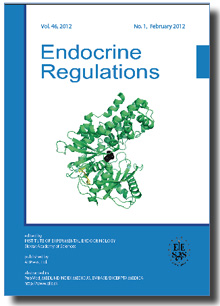Journal info
|
||
Select Journal
Journals
Bratislava Medical Journal Ekologia - Ecology Endocrine Regulations 2015 2014 2013 2012 2011 2010 2009 2008 2007 2006 2005 2004 2003 General Physiology and Biophysics Neoplasma Acta Virologica Studia Psychologica Cardiology Letters Psychológia a patopsych. dieťaťa Kovove Materialy-Metallic Materials Slovenská hudba 2025Webshop Cart
Your Cart is currently empty.
Info: Your browser does not accept cookies. To put products into your cart and purchase them you need to enable cookies.
Endocrine Regulations Vol.49, No.4, p.185–197, 2015 |
||
| Title: IRE1 inhibition affects the expression of insulin-like growth factor binding protein genes and modifies its sensitivity to glucose deprivation in U87 glioma cells | ||
| Author: D. O. Minchenko, A. P. Kharkova, D. O. Tsymbal, L. L. Karbovskyi, O. H Minchenko | ||
| Abstract: Objective. The aim of the present study was to investigate the effect of inhibition of endoplasmic reticulum stress signaling mediated by IRE1/ERN1 (inositol-requiring enzyme 1/endoplasmic reticulum to nucleus signaling 1) on the expression of genes encoding different groups of insulin-like growth binding proteins (IGFBP6 and IGFBP7) and CCN family (IGFBP8/CTGF/CCN2, IGFBP9/NOV/CCN3, IGFBP10/CYR61/CCN1, WISP1/CCN4, and WISP2/CCN5) and its sensitivity to glucose deprivation in U87 glioma cells. Methods. The expression of IGFBP6, IGFBP7, IGFBP8, IGFBP9, IGFBP10, WISP1, and WISP2 genes was studied by qPCR in control U87 glioma cells (wild-type) and its subline with IRE1 signaling enzyme loss of function upon glucose deprivation. Results. The expression of IGFBP8, IGFBP9, and WISP2 genes was up-regulated in control glioma cells upon glucose deprivation with most significant changes for IGFBP9 gene. At the same time, the expression of IGFBP6, IGFBP10, and WISP1 genes was resistant to glucose deprivation in these glioma cells, but the IGFBP7 gene expression was down-regulated. The inhibition of both enzymatic activities (kinase and endoribonuclease) of IRE1 in glioma cells modified the sensitivity of most studied gene expressions to glucose deprivation condition: introduced sensitivity of IGFBP10 and WISP1 genes to glucose deprivation, enhanced the effect of this deprivation on IGFBP7 and IGFBP9 gene expressions, and reduced this effect on WISP2 gene and induced suppressive effect of glucose deprivation on the expression of IGFBP8 gene. Furthermore, the inhibition of IRE1 strongly affected the expression of all studied genes in glioma cells upon regular growing condition in gene specific manner: up-regulated the expression levels of IGFBP7, IGFBP8, IGFBP10, WISP1, and WISP2 genes and down-regulated the IGFBP6 and IGFBP9 genes. Conclusions. The data of this investigation demonstrate that the expression of IGFBP7, IGFBP8, IGFBP9, and WISP2 genes are sensitive to glucose deprivation in U87 glioma cells and that inhibition of IRE1 signaling enzyme function may significantly affect the expression of all studied genes in the presence of glucose as well as modify the effect of glucose deprivation on the expression of most studied genes. These data also show that proteins encoded by these genes may participate in the regulation of metabolic and proliferative processes via IGF/INS receptors and possibly other signaling pathways as well, via IRE1 signaling, which is a central mediator of the unfolded protein response and an important component of the tumor growth and metabolic diseases. |
||
| Keywords: IGFBP6, IGFBP7, IGFBP8, IGFBP9, IGFBP10, WISP1, WISP2, mRNA expression, IRE1 inhibition, U87 glioma cells, glucose deprivation | ||
| Published online: 20-Oct-2015 | ||
| Year: 2015, Volume: 49, Issue: 4 | Page From: 185, Page To: 197 | |
| doi:10.4149/endo_2015_04_185 |
||
|
Price:
28.60 €
|
||
|
|
||

